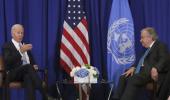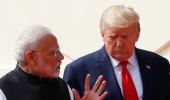PM Modi went to New York this time not to engage in polemics, but to find solutions to global problems.
He made some progress on several matters, even on reform of the UN Security Council, when the US made a major concession for the first time that six permanent members without veto, including India, could be considered, points out Ambassador T P Sreenivasan.

The annual United Nations General Assembly sessions are more ritualistic than real.
World leaders come to New York to make their presence felt on the international scene and to relish the sovereign equality of member States to address the entire membership on any issue of concern to them, even if many of the members exercise their right not to attend or develop selective hearing which picks up only anything new or significant.
The occasional disputes that are raised in the General Assembly lead to the traditional rights of reply with sparks flying for a short while.
Indian prime ministers and ministers of external affairs generally followed this pattern over the years, but this year, Prime Minister Narendra D Modi abandoned rituals and dealt with some realities of the global situation.
Modi made it known that he would not address the high-level segment of the General Assembly this year and gave that responsibility to EAM Dr S Jaishankar.
He went straight to President Biden's hometown, Delaware, to have a pow wow with the leaders of the Quad, the US, Australia and Japan, who share an increasing sense of threat from China.
All of them spoke behind closed doors about the threat from China in South Asia, the South China Sea, the East China Sea and Taiwan.
They discussed aggressive Chinese business practices around the world and sought cooperation among themselves to counter China.
Biden's leaked words oand the wording of the joint statement gave a flavor of the prevailing mood in the Quad on China.
India maintained its position that the Quad is not a military pact, but agreed to enhance military, political and economic cooperation with countries of the Quad since our assessment of China is not different from theirs.
It is clear that the various activities that the Quad has adopted will act as a deterrent to China.
The Quad has come of age as a counter to China and a factor for global good, though its bland nomenclature remains.
India has also added another brick to the edifice of growing relationship with the US by walking an extra mile on Quad.

At the 'Summit of the Future', organised by the UN secretary-general, PM Modi called for human centric and sustainable development, which proved successful in India.
He highlighted that India had lifted 250 million people out of poverty in the last decade.
With that experience, India will be able to work with the Global South in the area of poverty eradication.
He underlined India's commitment to One Earth, One Family, One Future as a guiding Principle.
Speaking of reform of the UN Security Council, he said that global action must match global ambition.
His brief and impactful speech was reflected in the outcome of the Summit.
Although Biden is leaving the White House in the new year, PM Modi made sure that there was progress in the commitment made by the US to share new and emergent technologies as seen in the agreements reached on semiconductors, jet engines and drones.
Biden showed no hesitation in committing greater cooperation in defence supplies, thus stressing the bipartisan commitment to India-US strategic cooperation.
Controversies like the strength of democracy in India and the Pannun case did not seem to have affected the dialogue in any way, though National Security Adviser Ajit K Doval did not join the PM's delegation as abundant caution.

It was at the diaspora meeting that PM Modi was at his best, as he not only celebrated his own third term as prime minister and his plans of the future, but also assigned a task to the 'Rashtradoots' of India regardless of their current nationality status.
As before, he demonstrated the enthusiasm of the Indian community in receiving him as the clout India and he wielded in American politics.
Barack Obama's words, 'You are a Rock Star' after the Madison Square Garden appearance after his first visit in September 2014 reverberated on Long Island.
Biden has repeatedly stressed the value of Indians and he must have endorsed the latest exhortation to them to be a bridge between India and the United States.

India's emergence as a peacemaker in the war in Ukraine is still nebulous, but the peacemaker role has been imposed on India by circumstances.
The West was angry over India's position of neutrality on the conflict and disregard of sanctions by purchasing oil from Russia, but it gradually found India useful to begin a dialogue, particularly after India managed to craft a consensus on the Russia-Ukraine war at the G-20 Summit in Delhi.
PM Modi's visit to Russia later appeared to be a setback for India's acceptability to the West, but his decision to visit Ukraine and to hug President Zelenskyy changed the picture and India became a candidate as a mediator in the conflict.
India has a position of opposition to mediation, partly because of the Tashkent experience which resulted in then prime minister Lal Bahadur Shastri's death.
Mediation is tricky because mediators would demand concessions from both sides to find a solution.
But India began making an effort in this case on the ground that India was not neutral on this matter, but clearly on the side of peace.
PM Modi's meeting with Zelenskyy in New York so soon after their first meeting in Ukraine seemed to suggest that some peacemaking was in the offing.
But Zelenskyy hinted that he was not entirely happy with Indian mediation.
He questioned India's oil deals and also stated that some world leaders were on a quest for a Nobel Prize for peace at the cost of Ukraine.
Reports of a China-Brazil peace initiative complicated the situation further.
But it will be a feather in India's cap and a return to the early years after Independence when India was a peace maker par excellence.
PM Modi went to New York this time not to engage in polemics, but to find solutions to global problems.
He made some progress on several matters, even on reform of the Security Council, when the US made a major concession for the first time that six permanent members without veto, including India, could be considered.
India welcomed it as a movement in the right direction, but cautioned that more discussions were necessary to reach a consensus.
India appeared to be shining once again in the international arena.
Ambassador T P Sreenivasan is a long-time contributor to Rediff.com.
You can read his earlier columns here.
Feature Presentation: Aslam Hunani/Rediff.com










